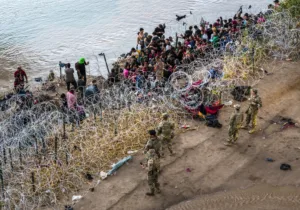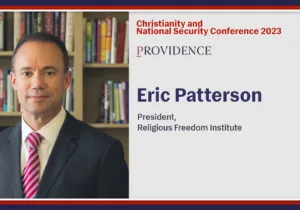From the outset of Christianity, Christ’s followers were the primary instruments for sharing the light and leaven of the Kingdom of Christ in the marketplace. This means that Christians were called to serve in all spheres of society, including being involved in serving in all agencies of government. Thus, when I started teaching at a Christian liberal arts college, I regarded my work not simply as the teaching of specific subjects but also as a means of equipping students to leave the academic environment to serve Christ in public life. In addressing the topic of the Christian faith and public policy, I want to briefly explore four themes, the first two in this post and the concluding two in a subsequent post.
- How to integrate Christian faith and public policy;
- Describe how some church groups have pursued immigration reform
- Explain why a communitarian perspective is important in addressing immigration issues; and
- Finally, sketch a framework that can help structure moral reasoning on immigration reform.
Christian Faith & Public Policy
The Bible is not a manual that offers answers to complex public policy issues. Nevertheless, it provides general perspectives and principles that can help structure moral analysis and guide decision-making. One of the temptations in Christian political engagement is the misuse of faith in public policy analysis and advocacy. This shortcoming is especially the case among evangelicals, who frequently use scripture to bolster their political advocacy.
The direct appeal to scripture, however, rarely contributes to public justice or the moral assessment of policies. More importantly, it can be destructive to faith itself. Examples of the misuse of scripture include the following: 1) prior to and during the American Civil War, Christians in the South used the Bible to defend the institution of slavery; 2) in the l950s and l960s, South African Boers (Afrikaners) used scripture to enact and justify the policy of apartheid; 3) when the Panama Canal Treaty was being discussed and debated in the United States in the late l970s, some Latin American theologians used prophetic texts of the Bible to defend the proposed measure; 4) and in 1985, a leading Presbyterian preacher in Florida used scripture (Nehemiah’s account of the building of Jerusalem’s wall) to defend President Ronald Reagan’s Strategic Defense Initiative.
Fundamentally, the Christian faith is about our spiritual life—our relationship with God. Christianity teaches us how to think and live as responsible human beings in light of God’s grace, manifest in the death and resurrection of Jesus Christ. As St. Augustine noted long ago and as Lutheran theology has made plain, Christians are members of the church, the body of Christ, but they are also members of the earthly kingdom—participating in the temporal responsibilities in family life as well as the cities and countries that they inhabit. Heavenly citizenship has implications over how we fulfill our responsibilities on earth.
In more than four decades of teaching political science at a Christian liberal arts college, I sought to teach my students the challenging task of integrating faith and public affairs. While I emphasized the importance of faith in public life, I also cautioned that the task of bringing faith to bear on politics needed to be undertaken with caution and humility. In particular, I emphasized that the integrative task demanded biblical and theological knowledge as well as deep knowledge of the public policy issues being addressed. In short, if believers are to integrate the responsibilities of the Kingdom of God with those of the Kingdom of Man, they need to be competent biblically and politically.
To my mind, the model of how churches should help define and apply a Christian perspective to public policy concerns is the 1983 US Conference of Catholic Bishops’ pastoral letter on nuclear weapons titled “The Challenge of Peace.” At that time, the American public had begun to debate the morality of national security rooted in nuclear deterrence. To manage the intense rivalry between the United States and the Soviet Union, a number of arms control measures were adopted to contain and circumscribe the development and proliferation of strategic armaments. Moral philosophers had been addressing questions about the ethics of nuclear deterrence, and church bodies began to examine this issue as well. By far the most noteworthy effort to morally assess nuclear deterrence from a Christian perspective was carried out by US Conference of Catholic Bishops from 1980 to l983. The 80-page document that was released in l983 was drafted by a committee of scholars and theologians and involved two preliminary drafts that were circulated widely among clergy, government officials, and the general public. When the final document was released, the media gave broad coverage to the report. Indeed, the New York Times placed the bishops’ letter on the front page and devoted nearly two full pages to the actual report itself. I know of no church study on a public policy issue that has received the coverage of the bishops’ letter.
The bishops’ letter is compelling because it is authoritative. And it is authoritative for three reasons: 1) it provides a thorough and compelling understanding of the problem of nuclear deterrence; 2) it sets forth relevant biblical principles and illuminates church teachings on war and peace, including a discussion of the relevance of just war doctrine; and 3) it integrates, in a nuanced and sophisticated manner, Christian political ethics with the issue of deterrence. Although the pastoral letter offers general recommendations, its chief contribution is the careful ethical analysis of the moral problem posed by nuclear weapons. And it does so by addressing the tension between freedom and national security, international peace, and nuclear deterrence. In short, the letter was influential because of its sophisticated moral analysis and therefore was able to contribute to the public policy debate on deterrence and arms control.
Regrettably, the political engagement of churches and religious groups on immigration reform in recent years has not lived up to the standard set forth in the pastoral letter. For the most part, church groups have been more interested in political advocacy than in seeking to illuminate how a biblical perspective might contribute to a more just immigration system.
Faith & Immigration
I now turn to the specific issue of immigration. In addressing this issue, my focus is on public policies—not with humanitarian impulses that arise when addressing particular concerns arising from the implementation of laws and policies. I mention this tension because international migration raises this issue with particular salience. Anyone who has visited an immigration court, watched videos of minors crossing the Rio Grande, or seen photos of children being detained and separated from parents or refugees crossing the Aegean Sea in rickety rafts can attest to the moral challenges and emotional impact arising from such knowledge. But the aim of laws and policies is to advance justice and the common good. If we are concerned with public policies, our concern must be on the efficacy of the policies themselves.
I got interested in the immigration issue when the National Association of Evangelicals (NAE) issued a short, two-page resolution in 2009 that, among other things, concluded that the US government wasn’t issuing enough visas to meet the demands for workers and for family unification. The problem of unauthorized migration, according to the documents’ drafters, was thus a failure of government policy—one that could be remedied by establishing a more generous, flexible system. When I began looking into this issue, it was clear that other Christian denominations were also calling for immigration reforms that would, among other things, strengthen due process protections for migrants, facilitate and increase family reunification, and provide legal status to the large group of unauthorized aliens living in the country. I had no problem with these and other recommendations being advanced by evangelicals, mainline Protestants, and Roman Catholics. My concern was that these groups were failing to provide a compelling biblical and moral analysis of the challenges posed by contemporary migration. Most troubling, some evangelicals—under the banner of welcoming the stranger—went to great lengths to use scripture to call for specific immigration reforms.
Unlike the Catholic bishops’ pastoral letter on deterrence, NAE’s reflections and assertions were not based upon a comprehensive account of international migration or a nuanced moral analysis posed by the rising demand of migration from poor countries to developed nations in Europe and North America. Indeed, the only document that seemed to provide an informed theological analysis was the 2012 study “Immigrants Among Us,” issued by the Lutheran Church Missouri Synod. And the study succeeded precisely because it sought to illuminate the theological ethics relevant to immigration issues rather than to advance particular policy recommendations.
Church documents on immigration also suffer an additional shortcoming. Besides failing to provide a careful integration of biblical ethics with the challenges of immigration policy, church resolutions and documents focus chiefly on the needs of migrants and disregard the role of government and the rule of law. To a significant degree, disregarding the state is a direct byproduct of viewing the world as a universal society of global citizens, an international community of persons bearing the image of God.
This Essay is an excerpt of a larger piece by Mark Amstutz, from the Providence print edition. Part Two will be released on Friday, October 10.






 Sponsor a student for Christianity & National Security 2024
Sponsor a student for Christianity & National Security 2024